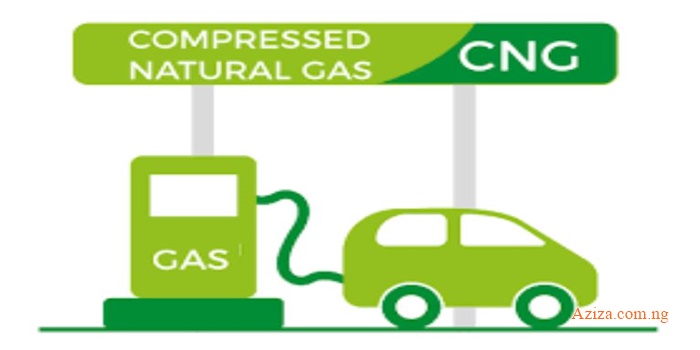In this post we will be looking at The meaning of Compressed Natural Gas (CNG), Uses of Compressed Natural Gas (CNG) and benefits of Compressed Natural Gas (CNG).
INTRODUCTION
Compressed natural gas (CNG) is a fuel gas mainly composed of methane (CH4), compressed to less than 1% of the volume it occupies at standard atmospheric pressure. It is stored and distributed in hard containers at a pressure of 20–25 megapascals (2,900–3,600 psi), usually in cylindrical or spherical shapes. CNG is used in traditional petrol/internal combustion engine vehicles that have been modified, or in vehicles specifically manufactured for CNG use: either alone (dedicated), with a segregated liquid fuel system to extend range (dual fuel), or in conjunction with another fuel (bi-fuel). It can be used in place of petrol, diesel fuel, and liquefied petroleum gas (LPG). CNG combustion produces fewer undesirable gases than the aforementioned fuels. In comparison to other fuels, natural gas poses less of a threat in the event of a spill, because it is lighter than air and disperses quickly when released.
Read: Company/ Business Registration Service
What is Compressed Natural Gas (CNG)?
Compressed Natural Gas (CNG) is a gasoline and diesel fuel alternative consisting primarily of methane. The gas is associated with other fossil fuels (coal or oil) and is created by methanogenic organisms in landfills.
Compressed natural gas is clean, odorless and non-corrosive. It is safer and more efficient than petrol or diesel and can be used as a motor fuel to power vehicles.
It is Commonly referred to as the green fuel because of its lead and Sulphur free character, CNG reduces harmful emissions. Being non-corrosive, it enhances the longevity of spark plugs. Due to the absence of any lead or benzene content in CNG, the lead fouling of spark plugs, and lead or benzene pollution are eliminated.
Contact: Oil and Gas Consultancy Service Company
Uses of Compressed Natural Gas (CNG).
Generally, compressed natural gas is primarily used as a substitute fuel for powering vehicles. However, it can also be used for power generation, water heating and air conditioning. The following are uses of CNG:
- Used as a substitute fuel for powering Motor vehicles: Any existing petrol vehicle can be converted to a dual-fuel petrol/CNG vehicle. Authorized shops can do the retrofitting, which involves installing a CNG cylinder, plumbing, a CNG injection system, and electronics.
- Locomotives: CNG locomotives are operated by several railroads and are usually diesel–electric locomotives that have been converted to use compressed natural gas generators instead of diesel generators to generate the electricity that drives the traction motors. Some CNG locomotives are able to selectively fire their cylinders only when there is a demand for power, which, theoretically, gives them a higher fuel-efficiency than conventional diesel engines.
- Used to transport natural gas by sea for intermediate distances: CNG is used to transport natural gas by sea using CNG carrier ships, especially when the infrastructure for pipelines or LNG is not in place. At short distances, undersea pipelines are often more cost-effective, and for longer distances, LNG is often more cost-effective.
Read: NCEC Certificate Registration
Benefits of Compressed Natural Gas (CNG)
Compressed natural gas is an alternative fuel that is not only economical but also easily accessible and offers great environmental benefits. Here are a few benefits of CNG:
- Safety: CNG vehicles are less likely to catch fire under any circumstances. In the event of a leak, CNG is lighter than air, meaning that it will dissipate into the atmosphere, unlike gasoline or diesel which pools on the ground and serves as a fire hazard.
- Compressed natural gas emits far less carbon compared to traditional fossil fuels.
- CNG has limited flammability making accidental combustion less likely.
- Compressed natural gas Improves of ecological aspects.
- Better performance: natural gas engines are superior in performance to gasoline engines because natural gas has an octane rating of approximately 130, whereas super and unleaded have octane levels of 95 and 98 respectively.
- Vehicles using compressed natural gas incur lower maintenance costs.
- Compressed natural gas does not contaminate your motor oil like traditional fuels do.
- Vehicles using CNG run quietly, eliminating noise pollution.
- Compressed natural gas Improves working conditions: Reduces noise, injuries of workers, vibration and excludes all manipulation with dirty fuel oil and the like.
- Quick return on investment in conversion: The repayment of the investment is achieved in a very short time, meaningful financial savings are achieved, operating costs are reduced in the field of meeting the energy needs.

